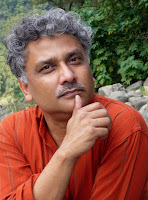Su AZIZ talks to Kunal BASU

 WORTHY OF A TAGORE
WORTHY OF A TAGORESu Aziz spoke to Kunal Basu, the prolific Indian author whose work has been compared to that of Asia’s first literary Nobel laureate, Rabindranath Tagore.
DID YOU KNOW that short stories have their origins in “oral story-telling traditions and the prose anecdote, a swiftly-sketched situation that comes rapidly to its point?”
To me, a book of short stories is the perfect weeknight read simply because it disciplines me to stop only when a story ends. Happily, this is rather quick when compared to a novel.
Now the million-word question is, just how different is it to write short stories compared to full-length novels?
As the author of a recently-published collection of short stories, Kunal Basu thinks there is no difference between the two.
“One needs the same resolve to begin and enjoy the same sense of euphoria when satisfied with one’s writing.
“Only short stories require more urgency in bringing matters to a close. I love to both read and write such stories. But I also like to hone my craft via a wide spectrum of writing, from screenplays and poetry to journalism and academic non-fiction.”
A professor of marketing at Oxford University, England, the 52-year-old father of one admits there is no trick or method when it comes to writing short stories. “They’re just exciting tales that one’s dying to tell others.” Sounds simple enough!
Having completed and published three novels, or as Kunal called them, “historical fiction“ (The Opium Clerk, The Miniaturist and Racists), his latest is a collection of short stories titled The Japanese Wife.
With a publisher for a father and an author for a mother, it was natural that Kunal took to writing. “I have, as far back as I can remember, always written. First in Bangla, which is my mother tongue, as well as in English.”
Kunal’s early writings were mostly poetry and literary essays. He only started writing novels about a decade ago. “Writing is my passion, something that I have to do every day. It is of the order of a grand obsession.”
He has also acted on stage and for film, but it is a minor interest, he said. “I started acting in Indian cinema, then did theatre, both in India and in Canada, where I lived for 13 years.”
He recently made a cameo appearance in The Japanese Wife, which has been turned into a movie by India’s celebrated director, Aparna Sen.
The Japanese Wife is a dozen short stories, including an intriguing love story: a marriage of many decades but one that was never consummated, fuelled only by old-fashion snail mail, the couple being separated by 6,500km of distance.
This curious story stemmed from Kunal’s travels through rural India many moons ago. “I heard about a village man who married a foreigner, which I thought rather unusual. Many years later, I wrote the story of “The Japanese Wife.”
“Stories are products of daydreaming and I am an avid daydreamer. A sentence overheard on the street, a news snippet or something innocuous could start off a chain of thoughts that lead to a story. People have asked me why a Japanese wife? I don’t know. The image of a simple Japanese woman just came to my mind.”
He cites the various inspirations for each of his 12 tales in the book. “The Grateful Ganga,” for example, is about a lover of Indian popular music. As a father, “The Pearlfisher” makes him wistful whenever he thinks about his daughter living in California. “Father Tito’s Onion Rings,” about a priest in Yugoslavia embroiled in a communal riot, is his way of giving vent to his drive for defending the downtrodden.
“I love travelling and so there’s a story about a dalang Yogya in the book, which always brings a smile to my face when I read it as it reminds me of a real-life dalang who had become my friend.”
Having taken over a decade to put pen to paper for these tales, Kunal said each story in this collection reflects to some measure the key preoccupations of his life during this period.
The most memorable comment about the book was when a reviewer compared the stories to those of Rabindranath Tagore.
“Worthy of a Tagore,” the reviewer wrote.
“I didn’t believe it for a moment, but it set my spirit soaring!” A compliment of the highest order, indeed.
The Japanese Wife the movie is due for release later this year.
Kunal voiced his admiration for its director. “I have seen a partly completed version and have been touched deeply. She [Aparna Sen] captured both the lyrical and surreal nature of the story. It is very funny and the music score is breathtaking, blending the Japanese koto and sakuhachi with Indian flutes.
“This is the first time that a Japanese actor has been featured in an Indian film and Chigusa Takako has given a stellar performance as have Rahul Bose and Mousumi Chatterjee.
“In many ways, this is a film for a world audience, not a film to be distributed abroad for the Indian diaspora.”
Today, between Oxford, writing and the myriad other creative things he is up to, Kunal still has time to read Omprakash Valmiki’s Joothan, about the personal memoirs of a dalit (the “untouchable” class in India). “It is a disturbing and deeply touching book,” he said.
If he had one wish, what would it be? “That the goddess of literature would descend on me and remain with me forever.”
His books are selling at MPH Bookstores and other major bookstores.
Interview courtesy of the New Straits Times of May 31, 2008
Labels: Kunal Basu, Su Aziz, The Japanese Wife


0 Comments:
Post a Comment
<< Home